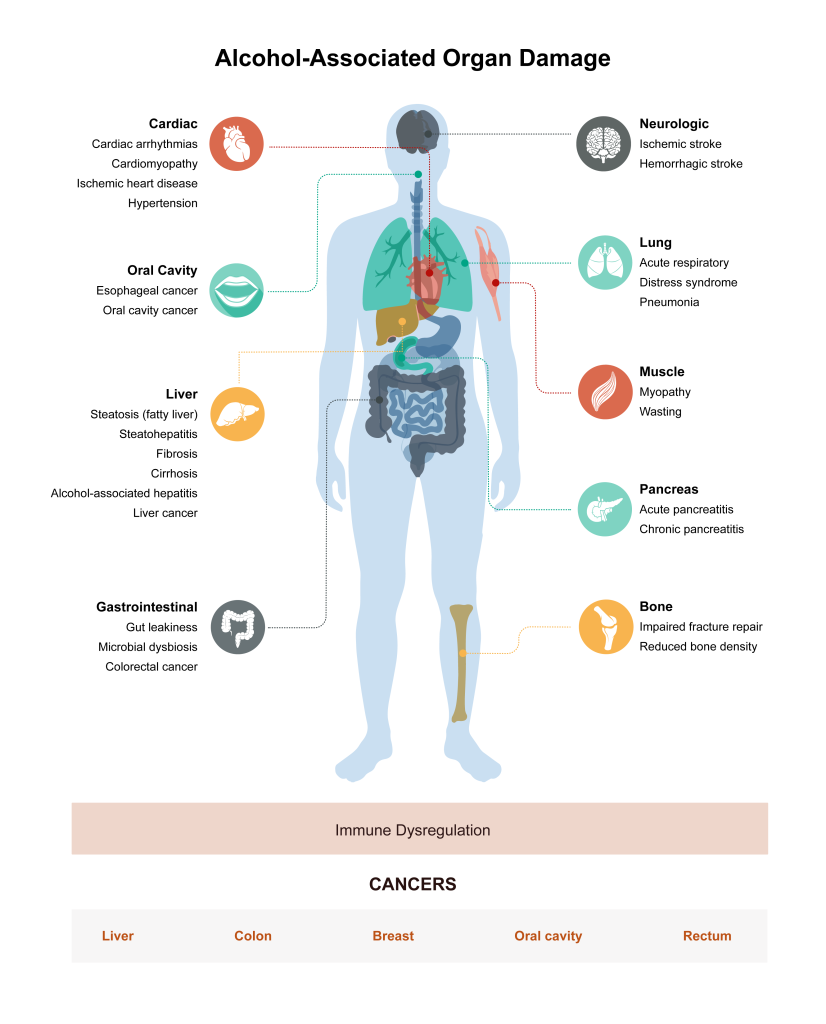Drugs Of Abuse – Alcohol Use Disorder
Published (updated: ).
According to the 2019 National Survey on Drug Use and Health (NSDUH), 85.6 percent of people ages 18 and older reported that they drank alcohol at some point in their lifetime, 69.5 percent reported that they drank in the past year, and 54.9 percent (59.1 percent of men in this age group and 51.0 percent of women in this age group) reported that they drank in the past month. In 2019, 25.8 percent of people ages 18 and older (29.7 percent of men in this age group and 22.2 percent of women in this age group) reported that they engaged in binge drinking in the past month, and 6.3 percent (8.3 percent of men in this age group and 4.5 percent of women in this age group) reported that they engaged in heavy alcohol use in the past month.

Drinking too much – on a single occasion or over time – can take a serious toll on your health. Here’s how alcohol can affect your body:
Brain:
Alcohol interferes with the brain’s communication pathways, and can affect the way the brain looks and works. These disruptions can change mood and behavior, and make it harder to think clearly and move with coordination.
Heart:
Drinking a lot over a long time or too much on a single occasion can damage the heart, causing problems including:
- Cardiomyopathy – Stretching and drooping of heart muscle
- Arrhythmias – Irregular heart beat
- Stroke
- High blood pressure
Liver:
Heavy drinking takes a toll on the liver, and can lead to a variety of problems and liver inflammations including:
- Steatosis, or fatty liver
- Alcoholic hepatitis
- Fibrosis
- Cirrhosis
Pancreas:
Alcohol causes the pancreas to produce toxic substances that can eventually lead to pancreatitis, a dangerous inflammation and swelling of the blood vessels in the pancreas that prevents proper digestion.
Cancer:
According to the National Cancer Institute: “There is a strong scientific consensus that alcohol drinking can cause several types of cancer. In its Report on Carcinogens, the National Toxicology Program of the US Department of Health and Human Services lists consumption of alcoholic beverages as a known human carcinogen.
“The evidence indicates that the more alcohol a person drinks–particularly the more alcohol a person drinks regularly over time–the higher his or her risk of developing an alcohol-associated cancer. Even those who have no more than one drink per day and people who binge drink (those who consume 4 or more drinks for women and 5 or more drinks for men in one sitting) have a modestly increased risk of some cancers. Based on data from 2009, an estimated 3.5% of cancer deaths in the United States (about 19,500 deaths were alcohol related.”
Clear patterns have emerged between alcohol consumption and increased risks of certain types of cancer:
- Head and neck cancer, including oral cavity, pharynx, and larynx cancers.
- Esophageal cancer, particularly esophageal squamous cell carcinoma. In addition, people who inherit a deficiency in an enzyme that metabolizes alcohol have been found to have substantially increased risks of esophageal squamous cell carcinoma if they consume alcohol.
- Liver cancer.
- Breast cancer: Studies have consistently found an increased risk of breast cancer in women with increasing alcohol intake. Women who consume about 1 drink per day have a 5 to 9 percent higher chance of developing breast cancer than women who do not drink at all.
Alcohol Withdrawal
Alcohol withdrawal refers to symptoms that may occur when a person who has been drinking too much alcohol on a regular basis suddenly stops drinking alcohol. Alcohol withdrawal occurs most often in adults. But, it may also occur in teenagers or children. The more you drink regularly, the more likely you are to develop alcohol withdrawal symptoms when you stop drinking. Alcohol withdrawal symptoms usually occur within 8 hours after the last drink, but can occur days later. Symptoms usually peak by 24 to 72 hours, but may go on for weeks. Common symptoms include:
- Anxiety or nervousness
- Depression
- Fatigue
- Irritability
- Jumpiness or shakiness
- Mood swings
- Nightmares
- Not thinking clearly
A severe form of alcohol withdrawal called delirium tremens can cause:
- Agitation
- Fever
- Seeing or feeling things that aren’t there (hallucinations)
- Seizures
- Severe confusion
